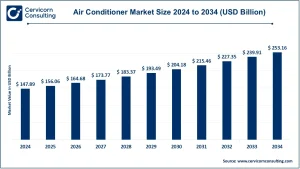Sustainable Manufacturing Market Overview
The global sustainable manufacturing market was valued at around USD 230.41 billion in 2024 and is expected to reach approximately USD 575.27 billion by 2034, growing at a CAGR of 9.58% from 2025 to 2034. Sustainable manufacturing emphasizes producing goods with minimal environmental impact, conserving natural resources, and promoting social and economic well-being. This approach integrates energy-efficient processes, renewable materials, waste reduction, and ethical labor practices, delivering long-term value for both businesses and society.
👉 Get a Free Sample: https://www.cervicornconsulting.com/sample/2441
Key Market Trends
1. Circular Economy Practices
Organizations are increasingly adopting circular economy strategies, focusing on recycling and reusing materials to minimize waste and optimize resource use. For instance, electronics and automotive manufacturers are redesigning products to enhance recyclability.
2. Digital and Smart Manufacturing
The integration of IoT, AI, and machine learning in production processes boosts energy efficiency, predictive maintenance, and resource utilization. Smart factories streamline operations while reducing environmental impact.
3. Sustainable Supply Chain Development
Companies are assessing the environmental footprint across the supply chain, from raw material sourcing to product delivery, promoting greener logistics and procurement practices.
4. Innovation in Material Science
Advances in biodegradable materials and energy-efficient composites are gaining traction, allowing the production of high-quality goods with lower energy consumption.
Market Drivers
-
Rising Consumer Demand for Eco-Friendly Products: Increasing environmental awareness motivates manufacturers to implement green practices, providing a competitive edge to sustainable product makers.
-
Government Initiatives and Regulatory Support: Policies worldwide encourage eco-friendly manufacturing via subsidies, tax incentives, and stringent environmental regulations.
-
Technological Advancements: Innovations such as additive manufacturing, precision automation, and renewable energy integration reduce waste, resource consumption, and operational costs.
-
Cost Efficiency via Resource Optimization: Efficient use of energy and materials lowers production costs while supporting sustainable practices.
-
Corporate Sustainability Goals: Growing commitments to net-zero emissions drive investments in green machinery, energy management, and sustainable supply chains.
Impact of Trends and Drivers
-
Industrial Sector: Implementing energy-efficient equipment, smart manufacturing, and waste management solutions reduces operational costs and carbon emissions.
-
Regional Impact: North America leads due to strict regulations and technological infrastructure, while Asia-Pacific emerges as a growth hotspot driven by industrial expansion and government incentives.
-
Applications: Areas like resource optimization, emissions reduction, and product lifecycle management directly benefit from technological innovations and regulatory support.
Challenges & Opportunities
Challenges:
-
High upfront investment in sustainable technologies.
-
Complexity in converting traditional production lines to eco-friendly operations.
-
Monitoring and maintaining sustainable supply chains.
Opportunities:
-
Expansion of green products for environmentally conscious consumers.
-
Growth in renewable energy integration and smart factory adoption.
-
Development of sustainable materials that reduce costs and environmental impact.
Future Outlook
The market is expected to continue expanding, driven by digital manufacturing adoption, circular economy practices, regulatory compliance, and innovations in material science and energy efficiency. Companies embracing these trends are likely to gain a competitive edge while contributing to global sustainability goals.
📩 Contact Us for a Detailed Overview: https://www.cervicornconsulting.com/contact-us
